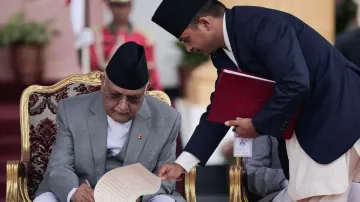KP Sharma Oli on Monday was sworn in as Nepal's 45th Prime Minister, the fourth time for him, to led a new coalition government that faces the daunting challenge of providing political stability in the Himalayan nation. However, he has to pass the vote of confidence in Parliament on July 21 in order to stay in power. On Friday night, Oli had staked his claim to become the next Prime Minister with the backing of NC President Deuba and submitted the signatures of 165 House of Representatives (HoR) members -- 77 from his Communist Party of Nepal-Unified Marxist Leninist (CPN-UML) party and 88 from the Nepali Congress.
(NC).
Oli will now need to secure a vote of confidence from Parliament within 30 days of appointment, which he is likely to secure easily as the minimum number to form a government in the 275-strong HoR is just 138. Oli announced a 22-member cabinet, with Bishnu Paudel picked as finance minister, and Arzu Rana Deuba of alliance partner Nepali Congress (NC) named foreign minister. Deuba is the wife of NC president and former prime minister Sher Bahadur Deuba.
Dahal was forced to prove his majority for the fifth time during a tumultuous 20-month tenure after UML withdrew support to his Communist Party of Nepal (Maoist Center) and formed a new alliance with NC, the largest party in parliament. UML leaders said the new alliance was needed to ensure political stability but have not elaborated on that. Nepal is one of the world's poorest countries and political instability has discouraged investment and hobbled its economic development, forcing millions of young people to seek work mainly in Malaysia, South Korea and the Middle East.
The instability has also sparked sporadic protests with people demanding the restoration of the monarchy saying successive governments had failed to live up to commitments to develop the country sandwiched between giants India and China. Political developments in Kathmandu are watched closely by rivals New Delhi and Beijing that pour development aid and infrastructure investment into Nepal and jostle for geopolitical influence.
Oli took Nepal closer to China by signing a transit agreement with Beijing in his first term in 2015-2016, ending India’s monopoly over landlocked Nepal’s foreign trade. On Monday, Indian Prime Minister Narendra Modi congratulated Oli and said he looked "forward to working closely to further strengthen the deep bonds of friendship between our two countries and to further expand our mutually beneficial cooperation for the progress and prosperity of our peoples".
Analysts said NC and UML, Nepal's two biggest parties, had taken a risk by pulling down Dahal's government and forming a new alliance. "This is risky and the last option," independent analyst Geja Sharma Wagle said. "If this coalition fails to deliver governance and political stability, the Nepali people will interpret it as the failure of the constitution and the system."
(With inputs from agencies)
Also Read: KP Sharma Oli sworn in as Nepal's Prime Minister, PM Modi congratulates and vows to deepen bonds
Latest World News
